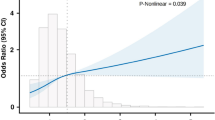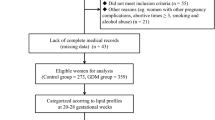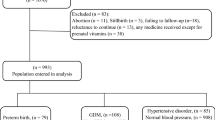Abstract
Aim
We aimed to evaluate the association of metabolic syndrome (MetS), its components and lipid profile in mid-pregnancy with preterm delivery and preterm premature rupture of membranes (PPROM).
Methods
This prospective cohort study was conducted on 203 pregnant women between 24 and 28 weeks of gestation, undergoing gestational diabetes screening test with 50 g glucose challenge test (GCT). Fasting serum total cholesterol, low-density lipoprotein cholesterol (LDL-C), high-density lipoprotein cholesterol (HDL-C), and triglyceride (TG) levels were measured during the week after GCT assessment. Information on the participants’ pre-pregnancy weight, demographic/reproductive characteristics, and height and blood pressure (BP) measurements were documented at baseline entry into the study. Metabolic syndrome was defined as the co-existence of 3 or more of the following criteria: Body mass index (BMI) before pregnancy ≥ 30 kg/m2, BP ≥ 130/85 mmHg, GCT ≥ 140 mg/dl, TG ≥ 150 mg/dl, and HDL-C ≤ 50 mg/dl. All participants were followed through routine prenatal care, up to delivery. Any deliveries or rupture of membranes of less than 37 weeks of pregnancy were considered preterm delivery and PPROM, respectively. Statistical analysis was performed by SPSS V.20, and p value of less than 0.05 was considered significant.
Findings
MetS was detected in 10 (4.9%) of participants. Logistic regression analysis showed HDL-C levels, and hypertension were associated with spontaneous preterm delivery [(OR 0.952, 95% CI 0.910–0.995), (OR 1.629, 95% CI 1.554–1.709) respectively], but no statistically significant results were found for PPROM.
Conclusions
Low HDL-C levels and hypertension in mid-pregnancy are associated with the occurrence of spontaneous preterm deliveries, indicating that MetS and its components should be monitored more closely in pregnancy.
Similar content being viewed by others
References
Reaven G (1988) Role of insulin resistance in human disease. Diabetes 37(12):1595–1607
Sinclair K, Bogart A, Buchwald D, Henderson J (2011) The prevalence of metabolic syndrome and associated risk factors in Northern Plains and Southwest American Indians. Diabetes Care 34(1):118–120
Souza LD, Berger H, Retnakaran R, Maguire J, Nathens A, Connelly P et al (2016) First-trimester maternal abdominal adiposity predicts dysglycemia and gestational diabetes mellitus in midpregnancy. Diabetes Care 39(1):61–64
Lim S, Shin H, Song J, Kwak S, Kang S, Yoon JW et al (2011) Increasing prevalence of metabolic syndrome in Korea: the Korean National Health and Nutrition Examination Survey for 1998–2007. Diabetes Care 34(6):1323–1328
Azimi-Nezhad M, Herbeth B, Siest G, Dadé S, Ndiaye N, Esmaily H et al (2012) High prevalence of metabolic syndrome in Iran in comparison with France: what are the components that explain this? Metab Syndr Relat Disord 10(3):181–188
Chatzi L, Plana E, Daraki V, Karakosta P, Alegkakis D, Tsatsanis C (2009) Metabolic syndrome in early pregnancy and risk of preterm birth. Am J Epidemiol 170(7):829–836
Roberts C (2010) IFPA Award in Placentology Lecture: complicated interactions between genes and the environment in placentation, pregnancy outcome and long term health. Placenta 31:47–53
Wiznitzer A, Mayer A, Novack V, Sheiner E, Gilutz H, Malhotra A (2009) Association of lipid levels during gestation with preeclampsia and gestational diabetes mellitus: a population-based study. Am J Obstet Gynecol 201(482):1–8
Grieger J, Bianco-Miotto T, Grzeskowiak L, Leemaqz S, Poston L, McCowan L et al (2018) Metabolic syndrome in pregnancy and risk for adverse pregnancy outcomes: a prospective cohort of nulliparous women. PLoS Med 15(12):e1002710. https://doi.org/10.1371/journal.pmed.1002710
Mu P (2004) Maternal role transition experiences of women hospitalized with PROM: a phenomenological study. Int J Nurs Stud 41(8):825–832
Nagano N, Okada T, Yonezawa R, Yoshikawa K, Fujita H, Usukura Y et al (2012) Early postnatal changes of lipoprotein subclass profile in late preterm infants. Clin Chim Acta 18(413):109–112
Noor S, Nazar A, Bashir R, Sultana R (2007) Prevalance of PPROM and its outcome. J Ayub Med Coll Abbottabad 19(4):14–17
James-Todd T, Wise L, Boggs D, Rich-Edwards J, Rosenberg L, Palmer J (2014) Preterm birth and subsequent risk of type 2 diabetes in black women. Epidemiology 25(6):805–810
Catov J, Wu C, Olsen J, Sutton-Tyrrell K, Li J, Nohr E (2010) Early or recurrent preterm birth and maternal cardiovascular disease risk. Ann Epidemiol 20:604–609
Catov J, Dodge R, Yamal J, Roberts J, Piller L, Ness R (2011) Prior preterm or small-for-gestational-age birth related to maternal metabolic syndrome. Obstet Gynecol 117:225–232
Cappelletti M, Bella SD, Ferrazzi E, Mavilio D, Divanovic S (2016) Inflammation and preterm birth. J Leukoc Biol 99(1):67–78
Challis JR, Lockwood CJ, Myatt L, Norman JE, Strauss JF, Petraglia F (2009) Inflammation and pregnancy. Reprod Sci 16:206–215
Esposito K, Giugliano D (2004) The metabolic syndrome and inflammation: association or causation? Nutr Metab Cardiovasc Dis 14(5):228–232
Esposito K, PontiUo A, Giugliano F (2003) Association of low interleukin-10 levels with the metabolic syndrome in obese women. J Clin Endocrinol Metab 88:1055–1058
Siahanidou T, Margeli A, Kappis A, Papassotiriou I, Mandyla H (2011) Circulating visfatin levels in healthy preterm infants are independently associated with high-density lipoprotein cholesterol levels and dietary long-chain polyunsaturated fatty acids. Metabolism 60(3):389–393
Vrijkotte T, Krukziener N, Hutten B, Vollebregt K, Eijsden MV, Twickler M (2012) Maternal lipid profile during early pregnancy and pregnancy complications and outcomes: the ABCD study. J Clin Endocrinol Metab 97(11):3917–3925
Mudd L, Holzman C, Catov M, Senagore P, Evans R (2012) Maternal lipids at mid-pregnancy and the risk of preterm delivery. Acta Obstet Gynecol Scand 91(6):726–735
Bartha J, González-Bugatto F, Fernández-Macías R, González-González N, Comino-Delgado R, Hervías-Vivancos B (2008) Metabolic syndrome in normal and complicated pregnancies. Eur J Obstet Gynecol Reprod Biol 137(2):178–184
Alexander C, Landsman P, Teutsch S, Haffner S, Third National Health, and Nutrition Examination Survey (NHANES III); National Cholesterol Education Program (NCEP) (2003) NCEP-defined metabolic syndrome, diabetes, and prevalence of coronary heart disease among NHANES III participants age 50 years and older. Diabetes 52(5):1210–1214
Biri A, Korucuoglu U, Ozcan P, Aksakal N, Turan O, Himmetoglu O (2009) Effect of different degrees of glucose intolerance on maternal and perinatal outcomes. J Matern Fetal Neonatal Med 22(6):473–478
Yun S, Han S, Lee S, Jung Y, Kim E (2013) Comparison of obstetric and neonatal outcomes according to oral glucose challenge test in Korean Pregnant Women. Korean J Perinatol 24(3):180–186
Basirat Z, Asnafi N, Kashifard M (2010) Correlation between abnormal glucose challenge test and pregnancy outcomes. J Reprod Infertil 11(2):113–119
Catov J, Bodnar L, Ness R, Barron S, Roberts J (2007) Inflammation and dyslipidemia related to risk of spontaneous preterm birth. Am J Epidemiol 166(11):1312–1319
Hotamisligil G (2006) Inflammation and metabolic disorders. Nature 14(444):860–867
Catov J, Bodnar L, Kip K, Hubel C, Ness R, Harger G et al (2007) Early pregnancy lipid concentrations and spontaneous preterm birth. Am J Obstet Gynecol 197(6):1–7
Catov J, Nohr E, Olsen J, Ness R (2008) Chronic hypertension related to risk for preterm and term small for gestational age births. Obstet Gynecol 112(2):290–296
Gilbert W, Young A, Danielsen B (2007) Pregnancy outcomes in women with chronic hypertension: a population-based study. J Reprod Med 52(11):1046–1051
Baliutavičienė D, Buinauskienė J, Petrenko V, Danytė E, Žalinkevičius R (2012) Gestational diabetes, obesity, and metabolic syndrome diagnosed during pregnancy. Metab Syndr Relat Disord 10(3):214–217
Lei Q, Niu J, Lv L, Duan D, Wen J, Lin X et al (2016) Clustering of metabolic risk factors and adverse pregnancy outcomes: a prospective cohort study. Diabetes Metab Res Rev 32(8):835–842
Stekkinger E, Scholten R, Vlugt MVD, Dijk AV, Janssen M, Spaanderman M (2013) Metabolic syndrome and the risk for recurrent pre-eclampsia: a retrospective cohort study. BJOG 120(8):979–986
Funding
This study was performed as the thesis project for a M.Sc. degree in Midwifery in Faculty of Medical Sciences, Tarbiat Modares University, Tehran, Iran. No external funding sources were provided for this study.
Author information
Authors and Affiliations
Corresponding author
Ethics declarations
Conflict of interest
The authors have no conflict of interest to declare.
Ethical approval
This research was approved by the Ethical Committee of the Faculty of Medical Sciences in Tarbiat Modares University, Tehran, Iran.
Informed consent
Informed written consent was obtained from all participants.
Additional information
Publisher's Note
Springer Nature remains neutral with regard to jurisdictional claims in published maps and institutional affiliations.
Rights and permissions
About this article
Cite this article
Niyaty, S., Moghaddam-Banaem, L., Sourinejad, H. et al. Are maternal metabolic syndrome and lipid profile associated with preterm delivery and preterm premature rupture of membranes?. Arch Gynecol Obstet 303, 113–119 (2021). https://doi.org/10.1007/s00404-020-05738-5
Received:
Accepted:
Published:
Issue Date:
DOI: https://doi.org/10.1007/s00404-020-05738-5




